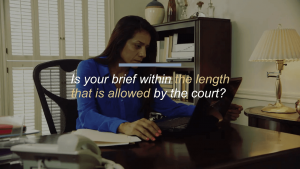Motions and Other Court Filings in an Appeal
In addition to the required forms, parties in an appeal frequently file other documents with the court. These other filings may include motions, requests, applications, oppositions, and stipulations.
Motions and other filings are only required when you need to communicate information to the court that is not included in a required form. For example, tell the court there is a problem or ask the court to do something.
Here are basic things to know about motions and other filings during an appeal
- After the appellant files the notice of appeal, any party can file a document with the court at any time during the appeal.
- There are no court forms for motions but some other filings have forms. If there is not a form, a party must create a document and include all the information the court needs to make a decision.
- It is best to complete court filings on a computer or a typewriter. You can only file handwritten documents with the court if you are representing yourself (you do not have an attorney) and you are not a licensed attorney.
- You must serve – or give – a copy of most court filings to all the other parties in the appeal before you can file them with the court.
- Some documents are filed in the trial court and some are filed in the Court of Appeal.
- Check with the court clerk to find out if you can file documents on paper or electronically.
Here are the most common types of motions and other filings during an appeal
(choose a filing to learn more)
Abandonment of an Appeal (Appellant files)
Request to Dismiss an Appeal (Appellant files)
Motion to Dismiss an Appeal (Respondent files)
Motion for Judicial Notice (Optional for Appellant and Respondent)
Motion to Augment the Record (Optional for Appellant and Respondent)
Notice of Omission (Optional for Appellant and Respondent to correct the record)
Motion for Relief from Default (Appellant or Respondent files)
Request to Reinstate an Appeal after Dismissal (Appellant files)
Opposition to a Motion (Optional for Appellant and Respondent)
Where can I get help with motions and other filings?
There are resources available at the court and online to help you. In this guide, you will find examples of motions and other filings. If you are not sure whether you need to file a form or another type of document, or if you have questions about court filings, you can contact the court clerk.
What happens next?
After a party submits a motion or other filing, the court will consider the party’s request. The court generally waits at least 15 days to make a decision. During this time, other parties have an opportunity to challenge the request.
If an opposing party wants to challenge a motion, they must write an argument against the request and file a document with the court. The court decides whether to grant or deny a motion. Sometimes the court denies a motion that has not been challenged by an opposing party.
All parties receive notice when the court makes a decision.
FORMS
Documents you will need for your case.



